ABOUT OCTOBER UNIVERSITY FOR MODERN SCIENCES & ARTS (MSA UNIVERSITY)

Welcome to October University for Modern Sciences & Arts (MSA University):
MSA University provides its students with the first British Education in Egypt and the Middle East, equipping students with creative, lifelong learning skills. We believe that our students graduate with many necessary and sophisticated writing, analytical and communicative skills, which is why MSA graduates succeed not only in their first job but throughout their entire careers.
MSA emphasizes three vital attributes for competitive capabilities: speed of response, adaptation, and harmonization, crucial in the digital age. Faculty and staff at MSA are dedicated to providing an education that thrives in today's complex business environment.

MSA in Numbers
Vision of MSA University:
We look forward to being among the top 500 universities in the world to lead the way in education, scientific research and community service.


Mission of MSA University:
October University for Modern Sciences and Arts (MSA University) is a leading Egyptian educational institution in higher education in cooperation with British Universities, MSA introduces well-developed academic programs using the latest technology and the most efficient staff.
It goes with the local and international quality standards; which allows its graduates to compete in the job market locally and globally. MSA is also focused on scientific research.
The Core Values of MSA University:
- Accountability
- Credibility
- Institutional Loyalty
- Inclusiveness
- Entrepreneurial Spirit
- Commitment to Quality

Student Life at MSA University
Student life at MSA University is vibrant, with diverse activities, clubs, and events fostering personal growth and community engagement.





Research Achievement Awards To Be Exchanged With Our UK British Partners
Our UK British partners enhance our educational programs with their expertise, ensuring high-quality academic standards and global recognition.

University of Greenwich

